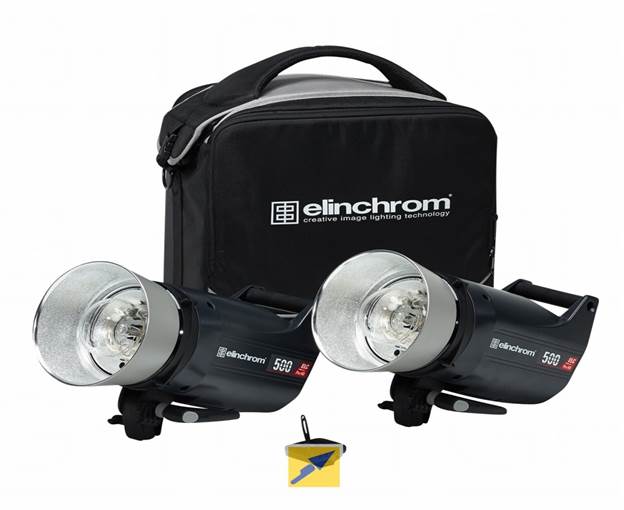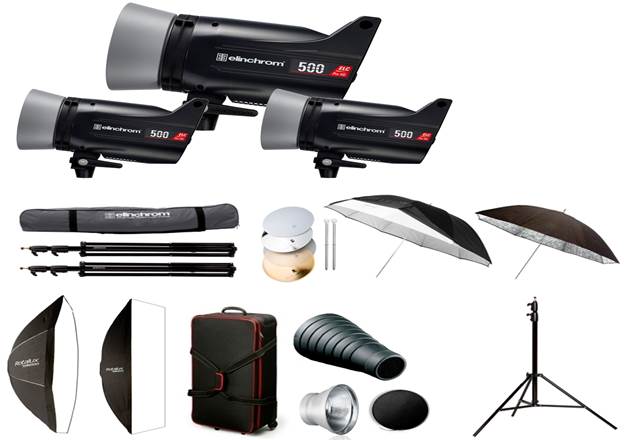Think big and deliver with the game-changing Elinchrom
ELC Pro HD monobloc heads.
Difficult locations, weather conditions, time constraints:
the world is conspiring against professional photographers. However, there are
a number of areas that photographers shouldn’t, and often aren’t, willing to
compromise on: reliability, consistency and creativity. It’s in this search for
creative control that editorial photographer, Les Wilson, turned to Elinchrom.
“The trouble is, when you’re a pro and you’re doing photo
shoots that matter and that count, you need reliability and performance,” says
Les, with a list of requirements that money or technology have previously
placed beyond his reach. This changed with the launch of Elinchrom’s ELC Pro HD
500 and 1000. The much-anticipated release offers visibly faster flash
durations (on the OLED display) for visibly sharper images, optimised colour
control at all power levels – minimising the need for post-production colour
management – and a new charge circuit that spreads the load and allows
jaw-dropping recycle times. This is even in addition to a host of unique new
features, including strobe, sequence and delayed sync. In essence, this is a
game-changer. “If you’re going on location with one light, this is the one,”
says Les. “It’s the Cadbury’s selection box of lights, because it’s got so many
facets to it. It does more, and it does it better, because the quality of the
light is that much more improved, and it’s a much better flash duration – in
particular, the quality of the light is very good.”
With the ELC Pro HDs, it’s about being able to shoot all of
the action. It takes a little bit to understand it because there’s so much it
can do: “It’s not a ‘plug in and go’ system, it’s a ‘plug in, learn and be
amazed’ system.”

With the ELC Pro
HDs, it’s about being able to shoot all of the action. It takes a little bit to
understand it because there’s so much it can do: “It’s not a ‘plug in and go’
system, it’s a ‘plug in, learn and be amazed’ system.”
The game changer
“We set out to build a unit that not only changes the way
photographers work, but also the way that they think,” says Elinchrom
President, Chris Whittle. In a recent review, photographer Adam Duckworth said
that “what sets the new Elinchroms apart from their rivals is their blazingly
fast flash duration” – but it doesn’t stop there. With faster flash duration
than any of its rivals, faster recycle times, and its ability to be used for
multi-flash strobe effects or sequence shots at the push of a button, the ELC
Pro HDs’ capabilities shouldn’t be taken lightly – it can allow you to think
bigger, and deliver more. They give accessibility to functions previously
exclusive to the most expensive systems available, but at £714 and £924
respectively, these kits could revolutionise working practice for your everyday
working pros.
Price point
The ELC Pro HDs replace the now discontinued RX range and,
on the face of it, the 500 Pro HD is retailing for more than the old RX 600.
However, factor in the fact that new HD heads have built-in Skyport receivers,
the glass dome covering the flash tube, and the disparity considerably
decreases. The comparison is consistent with the RX1200 and the 1000 Pro HD:
and the benefits over the old RX units don’t stop there, with the Pro HD heads
weighing in over half a kg lighter than the RX unit. The weight, however, is not
reflective of the robust build quality, or the reliability of the engineering
they encase.

The ELC Pro HDs
replace the now discontinued RX range and, on the face of it, the 500 Pro HD is
retailing for more than the old RX 600.
Reliability
“I put lights in the strangest of places, and you need
reliability – there’s no point flying or driving for what’s sometimes hours, to
then find that the lights don’t work! With Elinchrom you get that
dependability,” says Les. A regular contributor to The Mail on Sunday, Les has
used the Elinchrom system for over 15 years, but these latest releases – the
Pro HD 500 and 1000 – are the latest addition to his creative tool kit.
“When they release something, it works,” says Les. But he
admits that he has called upon the Elinchrom’s UK-based technicians: “I’ve had
power packs drop in the sea!” he laughs. “When you’re working on the beach,
it’s all the things you don’t want near a camera and lights, but as a pro, you
do work in these conditions!
That’s the reality of the job. And you need stuff that works
and does what it says on the package, in all conditions.” Whatever the dilemma
of the moment, Les tells me it’s one call, and he’s through to the Elinchrom
team. “They have their own workshops at The Flash Centre where they fix things,
when possible,” he says. “It’s a family company – they’re friendly and helpful.
If you have a technical problem, then they help you.”
Flash duration
The Elinchrom ELC Pro HD offers flash durations as fast as
1/5260s, giving you pin-sharp images. The new capacitor design means very fast
flash duration is maintained throughout the power range, not just at the top,
unlike most studio flash units where the duration rapidly lengthens at lower
power settings.
On location is where these new capabilities excel, says Les:
“When I go to a shoot, I don’t know what I’m going to be faced with.” And it’s
this versatility across the power range that allows peace of mind. “Sometimes I
want a flash with power that can be used as a key light, and other times I want
it to just fill in. It’s that flexibility that you’re after, and that these
lights offer.”

The Elinchrom ELC
Pro HD offers flash durations as fast as 1/5260s, giving you pin-sharp images.
Recycling speed
It’s a fast-paced industry, with time constraints and
pressure to perform – a blank image in a sequence is a tell-tale sign that your
flash isn’t keeping up with the pace. Les put the ELC Pro HD heads’
industry-leading recycling speeds to the test, shooting a bird of prey in
flight sequence. This also demonstrated the quality and consistency of the
light. “It was me seeing what they could do,” he says, “and I didn’t even push
them to their limits. People say this shot could be created with other lights,
but the difference is the amount of light it gives you (7-500W/s, 7-100W/s) and
very quickly. It was a second-long flight over 12 feet, on a 24mm lens, with
one shot… so it needed a lot of light.”
Colour temperature
Aside from speed, Les was impressed with the consistent
colour output: adjustments are sequential in order to enhance the flash
durations and minimise colour temperature variation across all power levels.
“It’s no good not having that,” he says, “as every image will look different.
However, every one hits the button. It’s like driving the jaguar of lighting
systems – it’s a quality piece of engineering, not a cheap and nasty thing.”
The heads will indicate if the exposure drops below full and their high-quality
components ensure very stable colour in every shot, even at heavy loads. The intelligent
capacitor management is the engineering behind the ELC Pro HDs’ ability to
maintain more consistent colour temperate than its predecessors. This is also
why the Pro HD 1000 is able to have a seven stop power range. Before this
technology, a 1000W EL head could not have gone down as low as 8W/s.

The intelligent
capacitor management is the engineering behind the ELC Pro HDs’ ability to
maintain more consistent colour temperate than its predecessors.